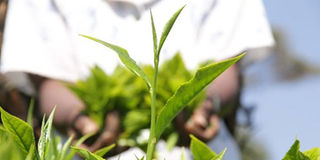Breaking: Autopsy reveals how Cyrus Jirongo died
Premium
KTDA mulls hedging of tea sector

A farmer picks tea leaves at her farm at Gathuthi village in Nyeri county on September 16, 2013.
What you need to know:
- Kenya’s small-scale tea sector stakeholders are contemplating hedging the industry through futures to cushion growers against plummeting returns.
- A hedge is an investment that reduces the risk of adverse price movements in an asset.
- Last week, KTDA raised the red flag over dropping prices which, it said, would have a major impact on the economy considering that tea is a major foreign exchange earner.
Kenya’s small-scale tea sector stakeholders are contemplating hedging the industry through futures to cushion growers against plummeting returns.
A hedge is an investment that reduces the risk of adverse price movements in an asset.
Going for futures contract is among the alternatives that a committee in the Kenya Tea Development Agency (KTDA) board was tasked to explore to save over 600,000 growers from the effects of price changes which the cash crop has been experiencing in the past seven months.
Last week, the agency raised the red flag over dropping prices which, it said, would have a major impact on the economy considering that tea is a major foreign exchange earner.
Speaking in Nyeri after his re-election as the Zone Four representative last week, chairman, Mr Peter Kanyago warned that poor tea prices would affect growers’ earnings.
While the committee chaired by a director from Murang’a, Mr Chege Kirundi, seeks the best way forward, Mr Kanyago said the government, too, should act to save the industry, especially by easing taxation.
“The committee should address the direction we should take in future; whether to embrace direct sales or go to futures contract because the situation is quite worrying.
It has never been like this in the past four years,” Mr Kanyago told directors from five factories in Nyeri County.
Going for a futures contract would mean that growers would be securing the selling price of their green leaf for a coming season, while the buyer would be securing the buying price.
Among the most controversial taxes imposed by the government last year is the one per cent ad valorem on exported tea, which raised the price of the produce at the Mombasa auction.
The government had in 2009 imposed another 0.5 per cent tax on tea destined for Pakistan — a key market of Kenya’s tea.
These levies have made the country’s tea the most expensive at the auction compared to those of Rwanda, Uganda, Tanzania, and Malawi.
“Buyers are going for the teas from these countries before coming for ours because they are cheaper.
The government should remove the duty and also set up a stabilisation fund to cushion farmers since tea is a major exchange earner,” the official noted.
Locally consumed tea is now subject to 16 per cent valued added tax, a factor which could retard the growth of the domestic market.
Only 10 per cent of Kenya’s tea is consumed locally while the rest is exported.
A country like Colombia has established a stabilisation fund to cushion coffee farmers whenever prices are low.
The Sri Lanka and India tea industries enjoy heavy subsidies from their respective governments.
Tea farmers are also lobbying the government to set up a similar fund and assist them find new markets through government-to-government negotiations with Russia, China, and the US.
So far, fertiliser does not attract value-added tax, but growers feel that its cost should be subsidised.
The industry is grappling with a 20 per cent rise in production which, together with the political situation in Egypt, a key destination of Kenya’s tea, has been the cause of the price meltdown.
KTDA said it is installing one orthodox tea production line in every zone as a way of diversifying income amid the renewed challenges.
Russia and many European countries consume orthodox tea.
Mr Kanyago said value-addition at the source could be good.
Penetrating the international market dominated by other established brands like Liptons was a major challenge.





